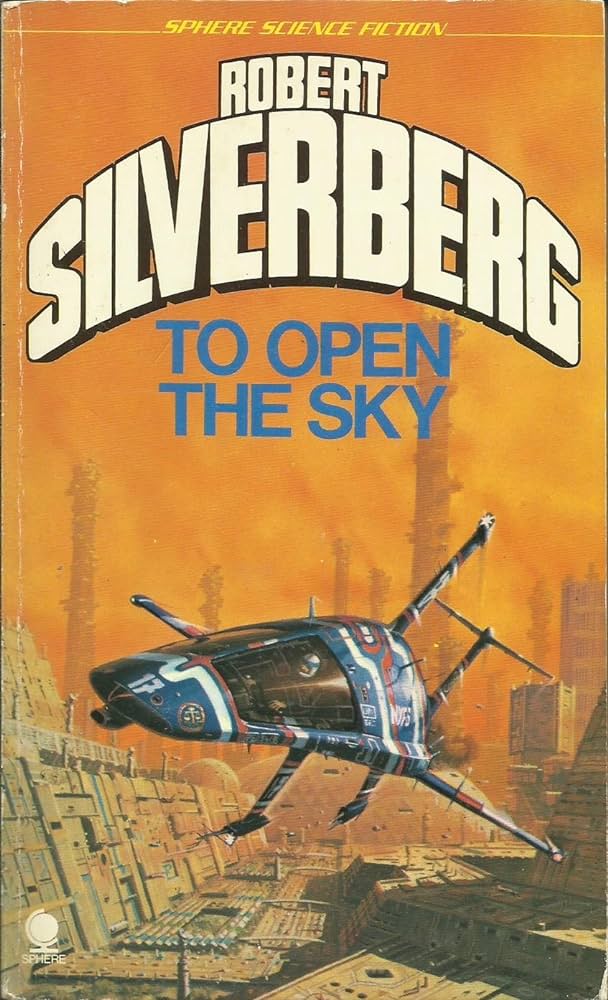
A Narrative That Opens The Mind
When it comes to Robert SIlverberg, it is a name that I’ve heard crop up when people talk about progressive science fiction books with unique ideas. However, until I found To Open The Sky in my local Oxfam charity shop, I hadn’t picked up one of his books until recently. I don’t regret it. To Open The Sky is a science fiction novel that explores a healthy balance of new technologies and novel societal changes without being too on-the-nose.
To Open The Sky is a wonderful example of what science fiction can be when it’s put together with scope and nuance. In lieu of gratuitous gadgetry or dystopian cliché, Silverberg weaves a future that’s startlingly real, populated with characters grappling with real moral, spiritual, and existential questions. The novel gives us a picture of humanity reaching for the stars—literally into the cosmos and metaphorically into a new understanding of its place within the universe. It explores a compelling dialogue between newly emergent technology and transformative social movements, and it does it with a sensitivity that keeps it from getting too preachy or didactic. Silverberg’s prose is thoughtful and persuasive, and he manages to convey big ideas while still keeping the human element forefront. The novel was a pleasure to read, but also a deep stimulation—having made me recall the power science fiction has to illuminate the present through imagination of the future.
With that being said, it is not without fault and can be considered a product of its time. In this review I want to delve into what worked and what didn’t, to explore the sci-fi tropes Silverberg uses well and those which dampen what the story could have been.
An Optimistic View of Technology & Society
What sets this novel apart in my humble opinion is its ability to remain grounded with plausible technological advancement, and how this is interwoven into society as a whole. Silverberg’s future is not only startlingly terrestrial with political undertones that resonate with society today, but edges on a fanciful perspective of how religion and spirituality may influence cultural perception of technology. His unique ability to envision a world in which technology and religion exist hand-in-hand, as opposed to independent ideas that polarise society is a breath of fresh air in the science fiction world.
In the book, Silverberg hypothesizes technologies which enable interstellar travel and lifespan extension, but which do not emerge individually. They emerge instead simultaneously—and frequently consequentially—upon mature ideological and spiritual demand. The techno-religious movement called the Pax, some sort of faith system which blends techno- and spiritual yearning, gives us an instance here. We have a philosophy here which wed scientific discovery and desire for transcendance, reflecting the manner wherein new technology often accompanies new worldview.
What’s most convincing in Silverberg’s technical treatment is his moderation. He does not assault the reader with technical writing or explication. He discusses the consequence of innovation—how it affects the relations among human beings, the establishments, and the patterns of belief.
Such subtle entanglement of science and society gives the novel a timeless feel. So much so that even in today’s world with AI penetrating every corner of the work force, Silverberg’s ideas around progress and the promise of a better world weighing against the perils of such innovation being used as destructive tools are eerie and pose a lot of relevant questions for today’s discourse:
- How can scientific rationalism be balanced with spiritual belief systems?
- Can advancements in technology be regarded as a good thing if it comes at the cost of certain morals or ethics?
- To what degree should philosophy guide our technological advancements?
To me this is the essence of science fiction; to create world and characters that entice you to ask the difficult questions – questions that don’t have a concrete, justifiable, real answer; only differing perspectives.
Silverberg’s subtle writing style and gentle introduction of these ideas presents a novel that promotes thoughtful exploration of these ideas, rather than a bombardment of being told how we should feel, or what we should think about these concepts.
The Blind Spot: Assumptions Around Faith
To Open the Sky probes the interaction between faith and reason profoundly, and what’s interesting about it is the way it explores assumptions we have relating to belief itself—above all, in a society becoming ever more technically advanced. Silverberg does not present faith as something outdated and disposable thanks to scientific progress, or present science as the savior that’s going to make all spiritual relevance a thing of the past. He positions the two as developing agencies, with limitations and failings within themselves.
The Pax movement is how Silverberg explores these ideas. This movement, on its surface, seems to be a liberal system of spiritual beliefs that blends with the technological developments of its day – to promote peace and unification for the greater good (in the exploration of the solar system). But the more subtle dynamic at the movement’s core is more sinister; that religion and religious beliefs can be engineered for control, perfected to influence behaviours, and administered by religious leaders as a means to an end.
This raises its own set of philosophical questions around faith systems, such as:
- When belief systems become a tool under the guise of advancement, at what point will they or do they become weaponised?
- Is faith still faith if it is engineered to suit a covert agenda? What do the believers, therefore, have faith in? A divine power or the administration?
- To what end do religious bodies and administrations serve to their own ends? Do we lose what makes faith important by entrusting our expression of faith to an institution?
Much like the first set of questions Silverberg subtly introduces into the narrative, he doesn’t offer any definitive answers. Rather, he promotes critical thinking about these questions and, in a unique way, challenges the administration of faith rather than having faith in and of itself.
Worth A Read?
For those who enjoy a narrative with sub-text and sub-context, yes! Equally, for those that enjoy stories more for their plot and character driven narratives, yes.
The unique thing about Silverberg’s ideas and this novel in particular is his ability to appeal to both kinds of sci-fi reader.
